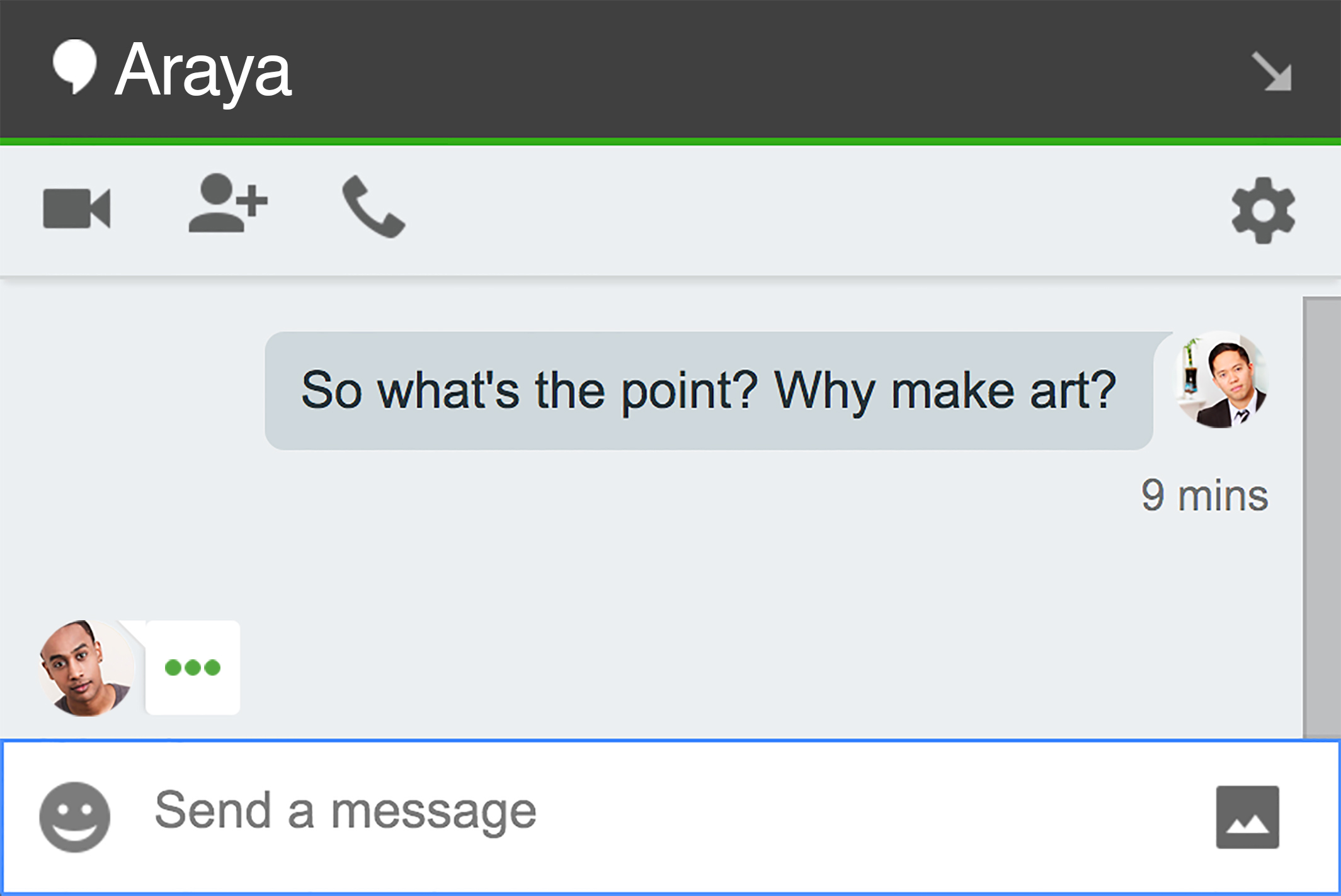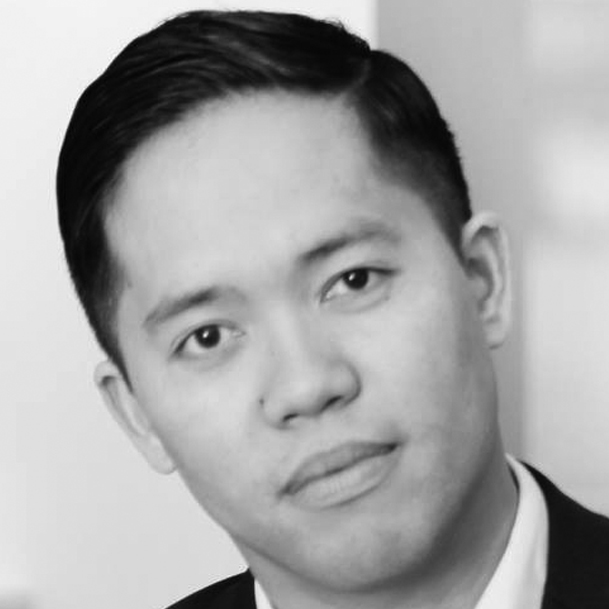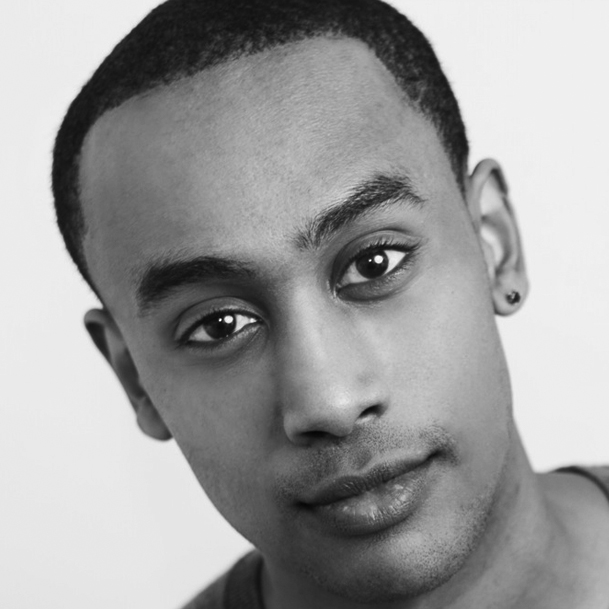“Are creators giving you better shit to do?”
Playwright Jason Maghanoy and actor Araya Mengesha have been working in the Toronto theatre world for a long time. With diversity at the forefront of discussion these days, the best friends shifted the focus of their GChat conversation, where they mainly talk about day-to-day life, to discuss what it’s like to be racialized artists in the industry and what keeps them going.
JASON
So what’s the point? Why make art?
ARAYA
Not sure that that’s really a question about art. Why make anything? It adds to our existence hopefully in some way that makes our lives richer, maybe makes us consider the world around us. I hope that what we do will, at the very least, allow whoever sees it a chance to pause and reflect.
That’s a pretty deep first question right out the gate. Why do you make art? Do you think there’s a point?
JASON
I make it because I hope that art makes the world a better place but… I don’t know. I feel like, if the world was all good and there was no conflict there’d be no art. What would I write about? Does that sound right?
ARAYA
That makes sense. Conflict is at the core of what makes the work. Even if there were no wars, there’s always internal conflict. That’s why good plays can be universal, everyone is able to recognize what opposition looks like, and we all deal with smaller or larger conflicts every day.
Is writing like acting for you, in that way? Do you go from your personal experiences and then attach them to bigger ideas or situations, or do you take an event and then distill it down? Or something else?
JASON
When I start writing it’s just characters in my head speaking to each other. Like, I would hear, “I’m sorry” and then someone says, “And?” and I’m like: Oh… I wonder what they’re going to talk about next. It can get loud and they can talk a lot and the more they talk the more I can see some kind of world and when I feel I just HAVE to write it all down I do. At the start there are no character names. Just dialogue. And I write it as fast as I can and for as long as it feels right and then I stop and then there’s a play at the end.
Well. That’s the hope at least. So in a way the characters speaking create everything. Real life most definitely informs. But in the end, these characters kinda just create themselves.
Speaking of acting, why did you decide to go into it?
ARAYA
Nice segue. I started acting when I was ten. My cousin, Weyni, was transitioning from acting to directing at the time and she introduced me to my first agent. Both of our parents were separated and we lived with our two dads. I was always a very hyper kid, who loved movies and TV, so she would get me to act stuff out for her. So, once I got an agent, it just became something I grew up with and slowly something that was part of my identity. When it was time to pick a “grown-up” job, I decided I would be a professional make-believer.
You said that it’s hearing real-life dialogue that starts everything for you. How do you feel about representation in your work? Do you ever feel a pressure to write an “Asian” play?
JASON
To be honest, no. So much of my work reflects me and my experience anyway, so… maybe that’s enough?
You’ve been working in the industry for a while. Almost twenty years, right? So two decades in, have the roles been evolving for black actors? Are creators giving you better shit to do?
ARAYA
Well… Most of that time has been me transforming from a kid into a man, so the roles have varied. I find that opportunities to be onstage have increased. Whether that’s an age thing or not is hard to say, but the kinds of roles are generally the same. Supporting character. The meatier parts are fewer and far between. It makes it hard to build a base for growth.
For some, like me, that means sometimes not auditioning for what seem to be less fleshed-out parts. It’s hard to not get frustrated when you see what looks like different variations of the same role again and again. The creative team also influences my decision on whether or not I might feel like a “token” actor once the rehearsal process begins. It’s a fine line, and my hesitance sometimes leads to missing out on what ends up being a great project. But, in my experience, the alternative can be worse.
If the opportunity for growing as a performer isn’t there—especially in theatre, where the time commitment is so great—then I would rather keep myself available for TV or film. I’ve been lucky to be in some great projects with large and smaller roles, but there’s always a weighing process: what am I getting back from the experience? Deciding what that “getting back” is and also keeping your ego in check is a weird thing as well. You don’t ever want to get into a habit of thinking you’re “too good” for a role, but then you get offered the same type of stuff repeatedly and you start saying,“I don’t want to just keep playing this part.”
Fortunately, a more progressive mindset is continuing to evolve slowly across the board. I’m getting to play Prince Hal/Henry V in Breath of Kings as part of the Stratford Shakespeare Festival’s upcoming season. That’s a lot of trust and responsibility given that I couldn’t be happier to step up to.
JASON
One of the things I find interesting for actors is that you get to see what’s coming next in terms of content. I mean, it’s pilot season right now, and so many of my friends are auditioning for these shows. I asked a friend last night, “What do you notice about all of it?” and she was like, “Everything is about time travel.”
So as actors you get to see where the content trends are, the stories people want to tell: vampires, superheroes, angels, gangs, and now time travel.
As a creator, I’m also wanting to create fresh work. But then I realize: That show I want to do about basketball, a thousand people want to make that same show. And there’s only so much I can do to make my show stand out, you know? So what helps an artist/creator stand out? How do you try to make yourself stand out?
ARAYA
I guess this is where we’re different. You’re a content creator, while my role is to flesh out what has been created. I can only stand out if what I bring to the table is my own and truthful to my experience. You can have many actors playing the idea of a character and then a few that are playing the scene, moment to moment, allowing that to dictate how the character behaves. Like the voices you talked about when you write your characters. Our job is to play like it is happening for the first time.
You’ve worked on the business side of things as well, do you find that there’s a template for what sort of projects get funding or produced year to year?
JASON
The projects that get funded seem to have a strong sense of urgency. Like: “Why does this have to happen, right now, here in this city?” If you can answer that question then you should be okay. And speaking of urgency, has there ever been a moment in your twenty-year career where you’ve been like: “I’m done. I think I have to do something else.”
I literally have that thought once a day. And then I have the chance to do something creative and I’m like, “That’s it, that’s why I do this, I don’t want to live an ordinary life.” But then the doubt comes back.
How do you beat back the doubt? And if you don’t have any doubt, yo, tell me your secret.
ARAYA
I don’t think that I’ve had the “I need to rethink my life choices” moment yet. Last year, though, I did start to feel like maybe TV/film wasn’t for me. I had gone a year with only a few auditions and then come close to a couple of things, but no bookings. I was thinking that maybe I just didn’t have the right look or presence for that sort of work. It can be really disheartening to feel as though your type of face doesn’t resonate. I had gone in for a role on a new CBC show, Shoot the Messenger, and it was for an East African role. RECURRING GUEST STAR EAST AFRICAN ROLE. That never happens. I felt like I was perfect for it, or at least that I would have a really good shot. I did my work, went into the audition to read on camera with a reader and camera operator, felt like I nailed it. Then radio silence.
Not even a callback. Weeks later, with the shoot about to start, I thought, “If I can’t even get a callback for something that seems tailored for me, then how am I ever gonna land something where someone needs to think outside the box to cast me?!” Funny enough it was after my first Breath of Kings audition for Stratford, where I was auditioning for a part that was outside the box, that I got the call from my agent: I had booked Shoot the Messenger right from that first tape. I never even met the director till I got to set. Just like that, faith is restored, and I live to play another day.
It’s a crazy life.
JASON
Which takes me to the final question of the day: Where are you in ten years?
ARAYA
I don’t know. I know that I want to be in a position to open doors for the people behind me and to be sharing that experience with the people I love. Hopefully, almost-forty-year-old me doesn’t feel like he compromised too much of himself in the process. And I want to make work that connects the diaspora here to the scene out in Ethiopia, where I’m from. A lady and a baby would be nice too.
Ten years, where you at?
JASON
Probably in my mansion.
Doesn’t matter how I get it.
I’m all about getting one of those.










Comments